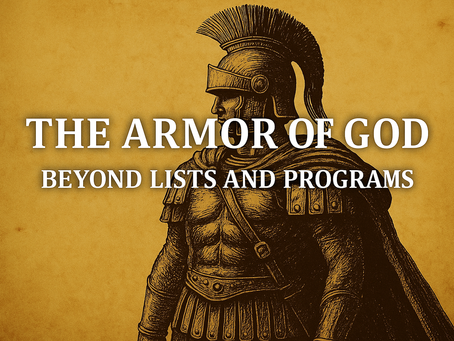top of page


The Fivefold Ministry: Gifts, Not Programs
The Fivefold Ministry: Gifts, Not Programs. Many churches today use the phrase “fivefold ministry” to describe the list of gifts Paul gives in Ephesians 4:11: apostles, prophets, evangelists, pastors, and teachers. Whole programs have been built around this idea, sometimes even marketed as if the Christian life could be managed through leadership formulas. Yet this misses Paul’s intent.
4 min read


The Regional Letters: Paul’s Network in Asia Minor
The Regional Letters: Paul’s Network in Asia Minor. When we think of Paul’s letters, we often divide them into categories like “Prison Epistles” or “Pastoral Epistles.” These categories are helpful, but they do not fully capture the web of connections that link certain letters together by geography, personnel, and theme. A closer look at Ephesians, Colossians, Philemon, and 1 & 2 Timothy reveals that they function as regional letters.
4 min read


The Armor of God: Beyond Lists and Programs
The Armor of God: Beyond Lists and Programs. Few passages in Paul’s letters capture the imagination like Ephesians 6:10–18, where he calls believers to “put on the full armor of God.” For centuries, Christians have drawn strength from the imagery of helmets, shields, and swords. Yet too often, this has been reduced to a rigid checklist or a “spiritual warfare program,” as if Paul intended a formula for battle.
4 min read


Book of Ephesians Summary: The Church in Christ
Book of Ephesians Summary: The Church in Christ. Ephesians is Paul’s grand vision of the church — not as an institution, but as the body of Christ, chosen before creation, redeemed by His blood, and empowered by the Spirit. Where Galatians thunders against false gospels, Ephesians soars in worshipful praise and cosmic perspective. It lifts believers’ eyes to God’s eternal plan in Christ, then brings that vision down into practical instructions for daily life.
6 min read


Election & Predestination
Predestination is one of the most misunderstood—and misrepresented—doctrines in Christian theology. Does God choose who will be saved in advance? If so, do we really have free will? What about those who never hear the gospel? Is God unjust? These are not just philosophical questions—they’re deeply personal ones. They strike at the heart of how we understand God's character and how we respond to His calling.
4 min read
bottom of page